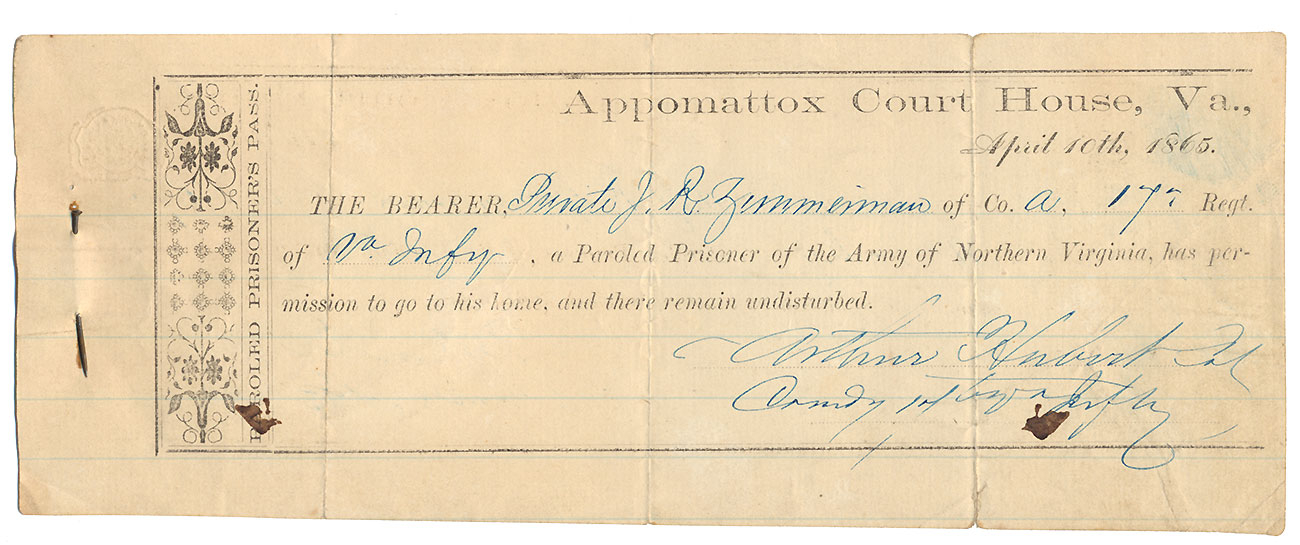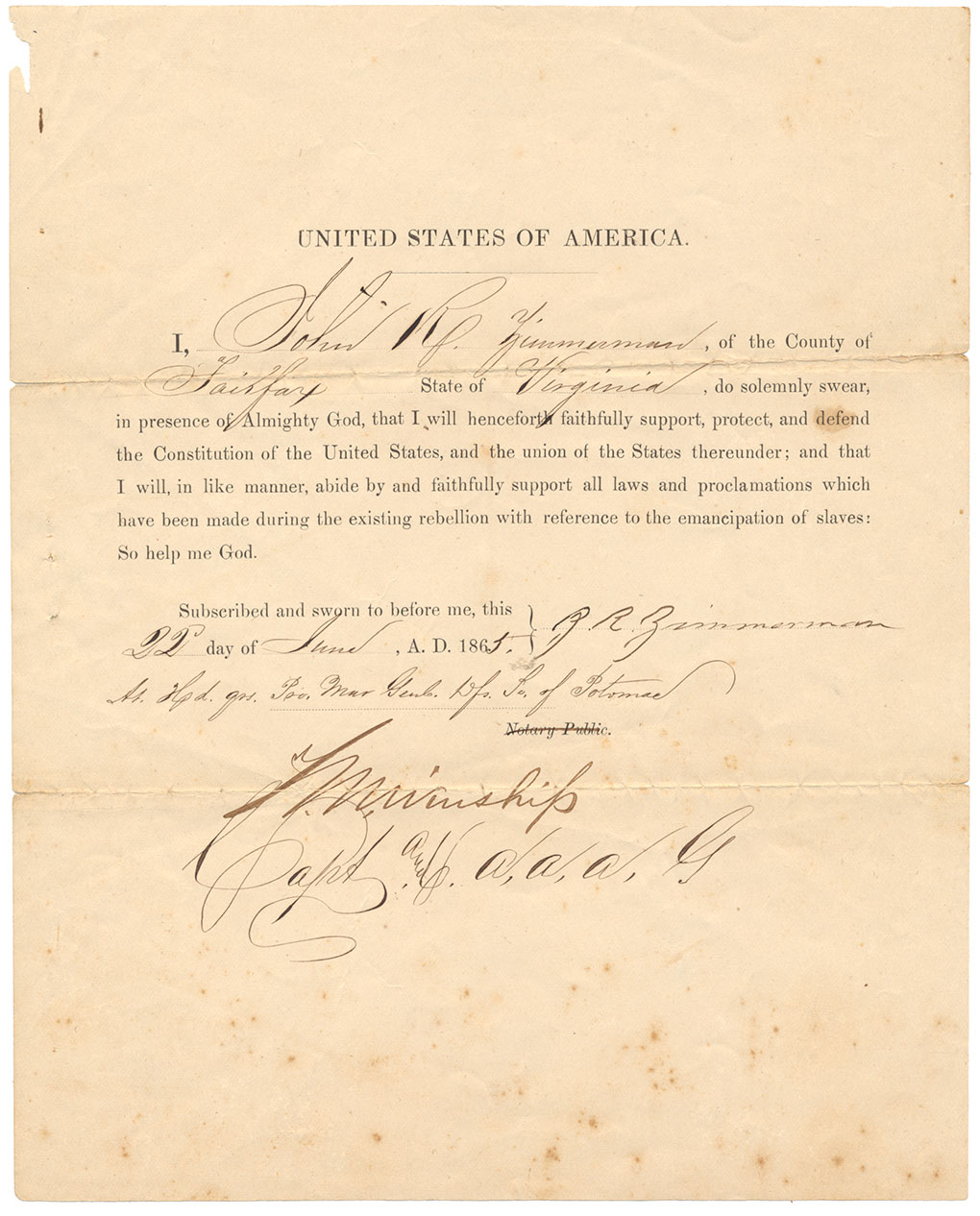site search
online catalog
APPOMATTOX PAROLE AND OATH OF ALLEGIANCE OF JOHN ROBERT ZIMMERMAN, 17th VIRGINIA- “IN THIRTEEN BATTLES” – MANASSAS TO APPOMATTOX

Hover to zoom


$5,500.00
Quantity Available: 1
Item Code: 1300-73
Shipping: Determined by Method & Location of buyer
To Order:
Call 717-334-0347,
Fax 717-334-5016, or E-mail
A great example of an Appomattox parole or “parole pass” from the collection of author and historian Greg Coco, along with the soldier’s June 1865 oath of allegiance. The parole bears one of the three designs on the left edge encountered on these, which is also one of two that adds, “Paroled Prisoner’s Pass.” This is partially printed and partially filled out by hand, dated “Appomattox Court House, Va., April 10, 1865,” and reads: “The bearer Private J.R. Zimmerman of Co. a, 17th Regt. of Va Infy, a Paroled Prisoner of the Army of Northern Virginia has permission to go to his home and there remain undisturbed.” At bottom right it is signed by “Arthur Herbert Col. / Comdg. 17th Va Inftry,” who also commanded Corse’s brigade at Appomattox. It is in very good condition, fully legible, showing two shallow vertical folds and a straight pin in the very left edge, which obviously fastened it to another document at some point. There are just two short separation lines at the top and bottom of the fold at right. Please see our photos of both documents.
Zimmerman’s oath of allegiance is filled out and signed by Zimmerman and a Captain and Acting Assistant Adjutant General at the Provost Marshal General’s office for the Defenses South of the Potomac on June 22, 1865, with Zimmerman swearing, “in presence of Almighty God, that I will henceforth faithfully support, protect, and defend the Constitution of the United States, and the union of the States thereunder; and that I will, in like manner, abide by and faithfully support all laws and proclamations which have been made during the existing rebellion with reference to the emancipation of slaves: So help me God.” Taking this oath is also recorded in his service file from his name appearing on a July 12, 1865, dated “Roll of Paroled Prisoners of war & others, who voluntarily surrendered their paroles and took the Oath of Allegiance at Alexandria.” This leaves open the question of whether the “surrender” of a parole was literal and these documents were retained by the Provost Marshal for some period of time or it was figurative in the sense that Zimmerman and others were giving up their status as enemy combatant prisoners of war and renewing their citizenship of the U.S. We rather think it is the latter, with the government retaining a duplicate copy or merely the roll referred to in his service file.
Zimmerman was born in Fairfax County in 1838, was a clerk by occupation before the war. He also seems to have been a member of a local militia company, the Alexandria Riflemen, in 1859. When they mobilized for active state service he officially enrolled at Alexandria at age 22 in the company under command of Capt. Marye on April 17, 1861, mustering in as a private on May 21 for one year, and then enlisting again, and receiving a bounty, in May 1862 when the regiment reorganized for the war. Extant muster rolls in his service file list him as present except for July-August 1862 when he is absent sick, from July 21, 1863 through March 1864 when he is prisoner of war, and then in hospital in Richmond for ten days from March 19 to 29, 1865.
The company became Company A of the 17th Virginia, which was accepted into CS service July 1. They were at First Manassas in Longstreet’s brigade, reorganized April 27, 1862, fought on the Peninsula, losing 17 killed and 47 wounded at Williamsburg, 18 killed and 41 wounded at Seven Pines (Fair Oaks,) 17 killed, 23 wounded and 73 missing at Frayser’s Farm. They later fought at Second Manassas in Longstreet’s flank attack on Chinn Ridge, taking 48 casualties, though Zimmerman’s file lists him as “absent sick” on the July-August 1862 muster roll. He is listed as “present” again on the September-October 1862 roll, which would include South Mountain, where they lost 13 more and Antietam where they were able to take only 55 officers and men into action, losing 7 officers and 24 men killed or wounded and another 10 taken prisoner. They were at Fredericksburg in December, and then in Longstreet’s Suffolk Expedition from February to May 1863, missing Chancellorsville, and during the Gettysburg Campaign were on detached duty at Gordonsville.
Zimmerman was captured at Manassas Gap on July 21. This was two days before the battle of Manassas Gap, or Wapping Heights, on July 23 when Meade tried to cut off Lee’s retreat after Gettysburg, and likely during preliminary maneuvering and skirmishes. He was apparently imprisoned for about eight months. He was paroled at Point Lookout and transferred to City Point for exchanged on March 16, 1864, according to one entry in his file. Another card in his file states he was exchanged the next day, but that could be an error- a receipt for a clothing issue on May 3 lists him (still) as a paroled prisoner, but he was likely exchanged and returned to duty soon after, since he is listed as “present” on the May-June 1864 company muster roll. This puts him back with the regiment in time for its service a Drewry’s Bluff, Cold Harbor and Petersburg, and seems to have been present and on duty in the company throughout, except for a hospital stay in Richmond from March 17 to March 27, 1865, putting him back in the ranks just days before the fall of Petersburg, evacuation of Richmond, and the retreat to Appomattox including fighting at Sayler’s Creek. The NPS site lists 2 officers and 46 men as surrendering on April 9. The parole list in in the Southern Historical Society papers lists 47 enlisted men, including Zimmerman. His entry in the 1870 regimental history states he participated in ten engagements with the regiments during his service.
Interestingly, Private Edgar Warfield of the 17th traveled home with Zimmerman and several others, recording that that they had to wait until Wednesday, April 12, to get their paroles, reached Richmond on Tuesday April 18 after a long footsore march, and received transportation from there to Washington the next day, though it took some convincing of the Provost Marshal in Richmond to get it since only rumors of the surrender had reached him and none of the terms involving transportation for the paroled Confederates.
Zimmerman seems to have spent the rest of his life in Alexandria. As late as 1910 he is listed there as a coal salesman. By 1920 he and his wife seem to be living with her relatives. He died in Alexandria in February 1926. His wife had passed away in 1921, but he seems to have been survived by at least two children. [sr][ph:L]
~~~~~~~~~~~~~~~~~~~~~~~~~~~~~~~~~~~
THIS ITEM, AS WITH ALL OTHER ITEMS AVAILABLE ON OUR WEB SITE,
MAY BE PURCHASED THROUGH OUR LAYAWAY PROGRAM.
CLICK HERE FOR OUR POLICIES AND TERMS.
THANK YOU!
Inquire About APPOMATTOX PAROLE AND OATH OF ALLEGIANCE OF JOHN ROBERT ZIMMERMAN, 17th VIRGINIA- “IN THIRTEEN BATTLES” – MANASSAS TO APPOMATTOX
Most Popular
Historical Firearms Stolen From The National Civil War Museum In Harrisburg, Pa »
Theft From Gravesite Of Gen. John Reynolds »
Selection Of Unframed Prints By Don Troiani »
Fine Condition Brass Infantry Bugle Insignia »
featured item
AUGUST, 1862 CONFEDERATE DISCHARGE – PVT. JOHN MCCOLLUM, 3rd ARKANSAS – EX COCO-COLLECTION
This scarce subtype of document served as a record of the honorable discharge of Pvt. John McCollum of Company F, 3rd Arkansas Infantry. He enlisted on September 17th, 1861 for a term of 1 year, and his discharge is dated August 15th, 1862 and he… (1300-85). Learn More »


